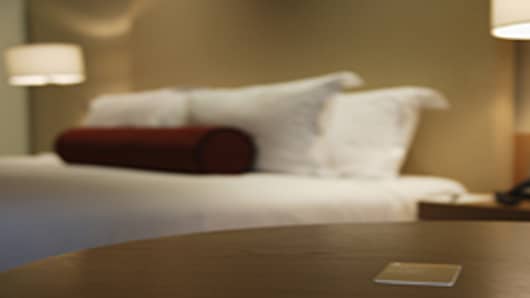(Click here for a related NBC News video.)
We booked hotel rooms in New Jersey where he did it again and again -- at a Hyatt, a Ramada, a Doubletree Hilton. This security flaw is so alarming, even hotel managers are stunned. "That's absolutely insane," one said when we showed him.
The device is so small, thieves can hide it in a magic marker. And criminals are learning how to make it watching videos posted online.
"Do you have to be a computer whiz to build one of these?" we asked Stickley.
"No, you could be a village idiot," he said. "Just go online and you can find step-by-step instructions and be done in a half hour."
All thieves have to do is plug it in, and it acts like a master key, even bypassing the deadbolt, giving criminals access while you sleep.
These locks are some of the most common in hotels worldwide. Millions of rooms may be affected.
What the Hotels Are Saying
We reached out to all the hotels in our story. Hyatt told us they've implemented security measures, but they wouldn't provide details. The other hotels either referred us to the industry group, or didn't respond.
Lakesha Barrow was ripped off at a Hyatt House in Houston. Her laptop, her jewelry, all stolen. "The moment I opened the door, I felt violated," she said. "My heart just dropped: Someone has been in my space, someone went through my stuff."
Police say it was Matthew Cook, who used the same kind of gadget at several hotels. Now charged with felony theft, he's pled not guilty.
So what's being done? The hotel industry and the company that makes the locks, Onity, have known about the problem since July. Onity says it has broadly communicated available solutions. But five months later, we found a Country Inn & Suites still in the dark.
"Were you aware of this problem?" we asked the manager.
"No." She said no one ever alerted her to the issue. "I want all my locks changed," she told us.
In a statement, Onity told us safety is the highest priority, that they've already fixed 1.4 million locks, and "all customer requests for these solutions have already been fulfilled or are in the process of being fulfilled."
Onity has given some hotels a free plastic cap to cover the port. The industry says they work, but not our expert.
"They're silly," Jim Stickley told us. "They're basically a temporary fix at best."
"Can a criminal still get through that?" we asked.
"Absolutely. It just takes a screwdriver and a minute."
Onity is also offering to upgrade the locks -- for a price. But many hotels haven't done it yet.
"Doesn't the buck ultimately stop with the hotels?" we asked Joe McInerny, president of the industry group representing hotels.
"Yes it is," McInerney said. "We're trying to figure it out."
"Bottom line, the hotel industry has known about this problem for five months, and while you and Onity work this out about who's going to pay for what and when it's going to happen, doesn't that leave hotel guests vulnerable?" we asked.
"Not really, because we have extra security in a lot of the hotels," McInerny replied. "We're really looking at this as a number one priority."
"But what about the hotels we visited?" we asked. "We were able to get in: Why not a criminal?"
"A criminal might be able to get in. And we really believe it's important for people to realize that they are secure in a hotel."
But are they? McInernry said they've hired an independent company to figure out the best solution —and that takes time.
"Months?" we asked. "Weeks?"
"Can't tell you," McInerny said. "I don't have a crystal ball."
But victims say that's not enough.
"They need to fix these locks, because if not, someone's life could be in jeopardy," Lakesha Barrow said.
So how do you protect yourself? Experts say: Use the security chain on the door. And if you leave your room, keep your valuables in the safe, or take them with you.










